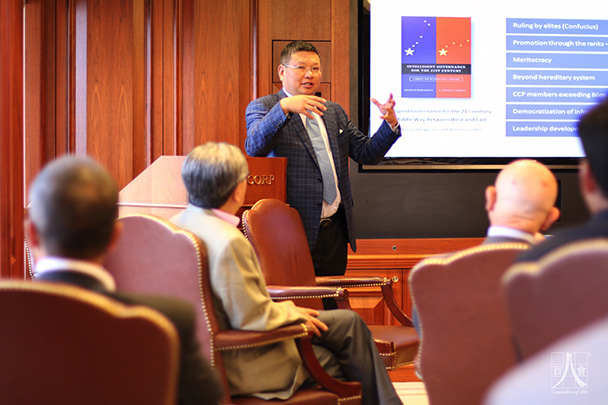Chinese government salary caps, surging Chinese investments in the US and the future of charity in China piqued the interest of the distinguished executives attending an exclusive lecture by CKGSB Founding Dean and Professor of China Business and Globalization Xiang Bing.
Dean Xiang delivered an engaging speech on “China’s Transformation and Its Potential Global Implications” as the guest of honor at a C-100 Executive Luncheon at Investcorp’s New York City office. Committee of 100 senior member, Columbia University trustee and Investcorp Chief Investment Officer Savio Tung hosted the event.

CKGSB Founding Dean Xiang Bing speaks at a C-100 Executive
Luncheon at Investcorp in New York City
Headquartered in New York City, the Committee of 100 is a membership organization of Chinese Americans dedicated to the spirit of excellence and achievement in America. With more than 20 years of impactful action, the Committee is respected as a strategic adviser to government leaders in both the US and China and has received public and media recognition for its involvement in issues affecting the advancement of Chinese Americans and the progress of US-China relations.
In addition to Mr. Tung, among the other executives in attendance were:
Throughout Dean Xiang’s in-depth and thought-provoking presentation, the attendees asked many questions. Some of the interactions surrounding the topics raised follow:
Why Would China Limit Government Salaries?
While discussing the Confucian-informed view in China that working for the government is the highest calling, Savio Tung asked why it is that the Chinese government has recently imposed a salary cap for its top officials. Wouldn’t this send more of the best and brightest to the private sector?
Dean Xiang said that from his point of view, the answer to this is rooted in the government’s priority on stability.
“If you think of income wealth inequality in China, stability by far is the most important concern,” Dean Xiang said.
He cited a speech he made in 2009 in which he stated that if you look at the past 30-some years, capitalism has been dominant in China. But for the next 30 years, Dean Xiang predicts socialism will take the lead to restore balance. Government officials will not be concerned about salary; they will be concerned about whether the party can still rule society.
C-100 member Wang Dazong shared his perspective as former CEO of a large state-owned enterprise (SOE) in Beijing.
“Today, you’re a CEO of an SOE in Beijing, tomorrow you could be vice mayor of Beijing,” he said. If the salary difference between those two government roles is too much, it makes that move too hard. Hence, the need for a salary cap for all government officials.
‘Hearing Mandarin on Park Avenue’
Henry Tang reflected on the tremendous penetration of Chinese businesses into the United States and in New York City in particular. He noted that while living in the same 10-15 blocks of one NYC neighborhood over the course of 20 years, he has witnessed this sea change first hand. “I’m hearing Mandarin on Park Avenue” with increasing frequency, he said, and he sees a trend of Chinese ownership of top-tier companies growing stronger.
To this, Dean Xiang said he predicts there will be a “Chinification of the global economy. This wave of globalization will be a force of change for commerce for the coming two decades.”
Shirley Young added to the discussion by noting that she sees there is a certain discrimination against the Chinese within the United States, likely rooted in cultural differences.
Dean Xiang elaborated on the biggest challenges he thinks China faces, in particular:
But Dr. Xiang said he is encouraged by what he sees as a fundamental Chinese characteristic. “The Chinese, we learn fast. Don’t underestimate our ability to learn,” Dean Xiang said.
The Future of Charity in China
Citing Dean Xiang’s statistics showing that institutional giving is a problem in China, C-100 Acting Executive Director Holly Chang inquired as to whether charity and philanthropy will be more encouraged in the future.
Dean Xiang said that Chinese President Xi Jinping does have a more favorable view of non-governmental organizations (NGOs) than previous leaders.
“In that regard, there’s a better future for NGOs in China,” Dean Xiang said.